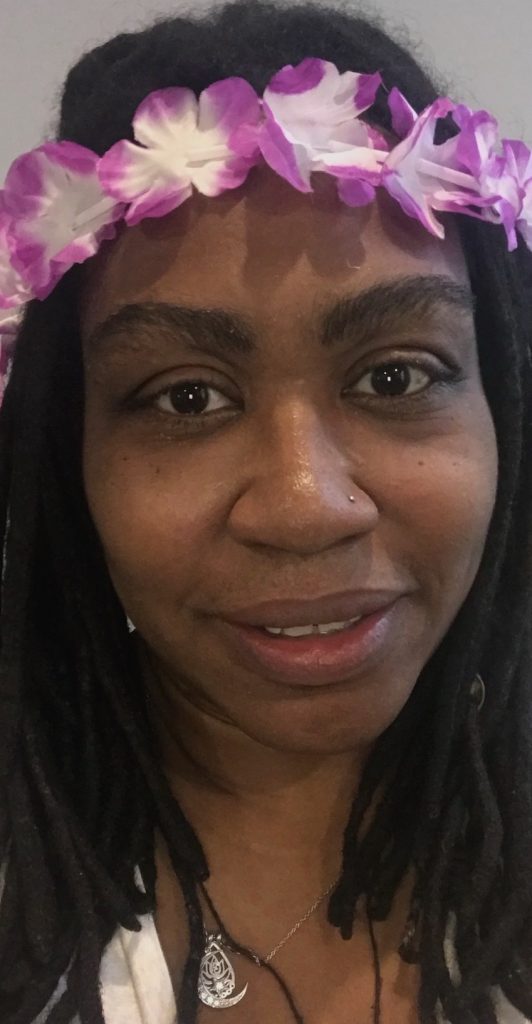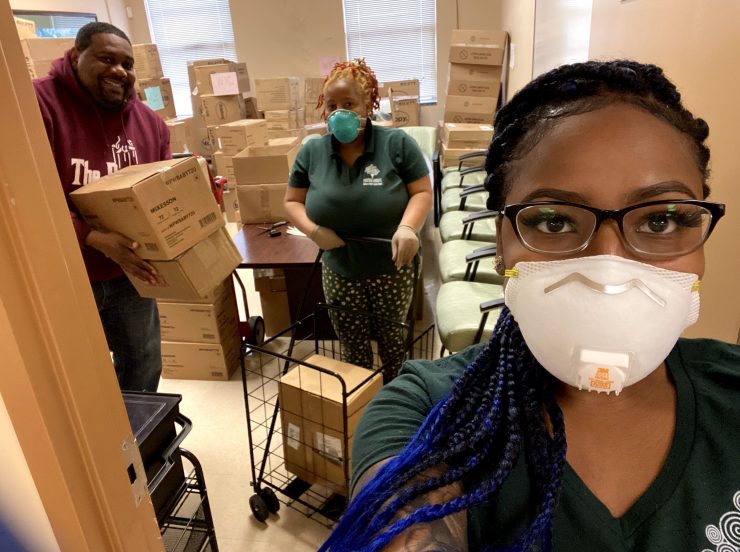Jameka Hansen wishes she had had advice and support groups available to her when she was breastfeeding her four children, who now range in age from toddler to teenager.
Because of this, Hansen feels a strong sense of empathy for the women needing answers about breastfeeding whom she has assisted with B’more for Healthy Babies (BHB), a place-based initiative through Promise Heights designed to improve the infant mortality rate in the Upton and Druid Heights neighborhoods. Hansen repeatedly made important parenting choices without outside advice or guidance and now recognizes how community support would have helped when she made the decision to breastfeed each of her children.
“I’m from Baltimore, but I lived in Pennsylvania for 10 or 11 years, so my first two kids are technically from Pennsylvania. It was just me and my husband at the time — I didn’t have any other family there, so I’m not even sure how I made the decision to choose breastfeeding,” said Hansen, a BHB advocate in the program’s parent-led Community Achievers group. “I guess I wanted to be as natural as possible. I had natural births, so I wasn’t thinking about formula or anything.”
Since launching in 2009, BHB has played a significant role in improving Black maternal and infant health by offering and supporting choices made by Black families in Upton/Druid Heights. Among its many programs, BHB promotes breastfeeding by providing community-based breastfeeding groups and one-on-one lactation support services, connecting mothers with lactation services and support, while also providing breast pumps, pillows, and other tools that moms and babies need.
‘A Lovely Journey’

Hansen reflected on her own experiences when she arrived at BHB, something that many Black mothers have encountered: a realization that everyone brings their own family traditions, rituals, and knowledge. She reiterated a concern that due to these realities, many Black women can be unprepared for or face resistance about breastfeeding options.
“I was also surprised to hear how many people weren’t supportive of women wanting to breastfeed,” Hansen said. “I mean, it was surprising to hear the nonsupportive stories of people [criticizing] women who were thinking about breastfeeding. That’s why support groups are so important!”
At the same time, the BHB team knows that many mothers find that they’re not able to breastfeed, and that deciding to choose breastfeeding is a matter shaped by culture, opportunity, time, and family and community support. They’ve maintained a consistent focus of aiding a range of family needs, and when the COVID-19 pandemic lockdowns made it difficult to provide in-person services, BHB quickly shifted to virtual platforms to remain accessible to potentially isolated families.
Deniya Chapman reached out to BHB for help when she was unable to produce milk.
“Breastfeeding is a lovely journey that may not have been meant for me,” Chapman said. “My body failed me twice by my milk drying up no matter what I did.”
With BHB’s help, she was able to breastfeed her daughter for at least four months.
“The sounds of my baby breastfeeding was music to my ears, and I loved every moment of it, and I hope to hear it one day again,” she said.
Partnerships Are Key
Promise Heights’ BHB director Stacey Stephens MSW, LCSW-C, brings passion to a variety of strategic policies impacting families. Stephens has led the BHB team in collaboration with residents and community partners to a crucial 75 percent reduction in the infant mortality rate in Upton/Druid Heights in the past decade. That neighborhood is now celebrating the lowest rate in Baltimore City, which is among Maryland’s lowest.
This success is in part achieved through partnerships.
“We provide support services and training for program participants and staff members who express an interest in assisting other women in their breastfeeding journeys,” Stephens said. “We’ve heard from clients that they wanted lactation counselors who look like them and were readily available to support their needs in their community, so we invited West Baltimore’s Bloom Collective to provide virtual lactation training to participants during the pandemic. This group of perinatal and postpartum practitioners is dedicated to maternal health, birth and reproductive justice, and community sustainability, and they’ve been essential partners by advancing BHB’s ongoing efforts.”
Angelise Shelby, MSW, one of BHB’s licensed social workers, reiterated the importance of these support groups.
“As an organization, our overall ability to provide wraparound services for these moms has increased. Having BHB staff and community members trained in lactation support services means a referral to another organization may not be necessary, as moms can get the need met where they’re already comfortable,” Shelby said. “We can also answer questions of pregnant mothers who are interested yet may feel ambivalent about the idea. Ultimately, we’re here to support our families’ feeding goals for their babies.”
Supporting Personal Choices
Now that Hansen has been involved with BHB for several years, she brings all of these experiences as a support mom to help share knowledge about lactation with moms like Chapman to explore the full variety of personal choices that all families may face.
“I also found how important it was to support whatever decision a mother makes, while leaning more closely to the benefits that breastfeeding offers,” Hansen said.
For Hansen, the BHB experience fostered a bond among mothers who shared the importance of prioritizing their health for the sake of their children.
“Being a parent is the whole experience, especially when the kids are little. The team inspires me to start sharing something, and the whole rest of the conversation is about sharing your experiences. You want to stay on top of it,” Hansen said. “Time goes so fast with our kids. It’s so important that you know how to take care of yourself so you can take care of the baby in as caring an environment as possible. This sets the tone for everything else around you. It’s a continuation — from being pregnant to breastfeeding — our own health is very, very important.”
Today, Hansen remains an active member of the BHB advocacy team of Community Achievers and continues to volunteer to help families through various activities such as making care baskets.
She also continues to advocate for families who choose breastfeeding, while helping countless caregivers improve their family’s health and “make the best of it.”
Thankfully, these advances are likely to bring continued BHB reports of reductions in Upton/Druid Heights’ infant mortality rate as well as increased prosperity among their residents.




